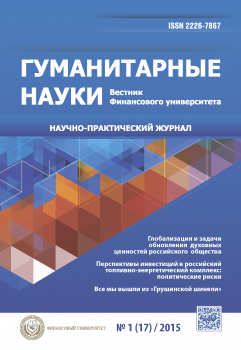Globalization is an objective process and a basic trend of the global community of the 21st century’s development. The article considers linguistic aspects of this phenomenon.«Linguistic globalization» is commonly understood as dynamic dissemination of the English language, growth of its relevance in the world. To date, English is studied in 90 countries around the world. The number of people speaking English makes more than 1 billion 100 million people. English is widely used in the fields of economy, business, education. Wide expansion of English leads to the emergence of its new varieties. However, linguistic globalization is changing not only the familiar picture of the existence of English but also of other languages. In the late 20th-early 21st century Russian language has been strongly subjected to linguistic globalization. There should be distinguished three tendencies in the development of the Russian language. The first is the Russian language development of the formerly closed world space. The second is the change in the status of the Russian language and the nature of the cultural and linguistic relations in the former republics of the USSR. The article describes the state of the Russian language in each of the former republics: its status, demand for it in the formal business sector, in the field of education and culture; both positive and negative tendencies of its development are identified. The third is developing the language policy in the Russian Federation, strengthening the role of the Russian language as the state constituent one. As a language of international communication, the Russian language is experiencing the negative impact caused by radical changes in public and political life of Russia. The result of it is negative tendencies in the development of the language itself (excessive linguistic borrowing, development of youth slang and language of computer communication, etc.).Measures to protect the Russian language are a response to the precipitous decline in spoken language culture.
linguistic globalization, English language, Russian language, state language, the language of international communication, official language, foreign language, learning a language, Language Act, language status.
1. Balandina L.A., Ganina E.V. Russkij I anglijskij jazyki v kontekste globalizacii [Russian and English languages in the context of globalization]. Problemyjazyka v global’nom mire. Moscow, Prospekt Publ., 2016.
2. Judina I.V. Russkijjazyk v XXI veke: krizis? jevoljucija? progress? [Russian language in the XXI century: the crisis? evolution? progress?]. Moscow, Gnozis Publ., 2010.
3. Jazyk I obshhestvo v sovremennoj Rossii I drugih stranah: Mezhdunar. konf. (Moskva, 21-24 ijunja 2010 g.): Dokl. isoobshh. [Language and Society in Contemporary Russia and other countries]. Moscow, 2010.
4. Judina I.V. O nekotoryh osobennostjah rechevogo portreta nositelja russkogo jazyka nachala XXI veka [Some features of the portrait of the speech carrier of the Russian language the beginning of the XXI century]. Lingvofilosofskij portret sovremennoj jazykovoj lichnosti: Mat-lyMezhdunar. nauch. konf. Moscow, Vladimir, IJa RA, VGGU Publ., 2008.
5. Severskaja O.I. Sredstva massovoj informaciii «navjazannaja norma» [The media and “imposed norm”]. Jazyk I stil’ sovremennyh sredstv massovoj informacii: Mezhvuz. sb. nauch. tr. Vserossijskojkonf., posvjashhennoj 80-letiju prof. N.S. Valginoj. Moscow, MGUP Publ., 2007.
6. Kakorina E.V. Aktivnyeprocessy v jazykesredstvmassovojinformacii[Active processes in the language of the media]. Sovremennyj russkij jazyk: Aktivnye process na rubezhe HH-HHI vekov. Moscow, Jazyki slavjanskih kul’tur Publ., 2008.
7. Krongauz M. Russkij jazyk na grani nervnogo sryva. [Russian language is on the verge of a nervous breakdown.]. Moscow, Znak Publ., 2009.
8. Anishhenko O.A. Slovar’ russkogoshkol’nogozhargona XIX veka. [Dictionary Russian school jargon of the XIX century]. Moscow, OOO «Izdatel’stvoJeLPIS» Publ., 2007.
9. Balandina L.A., Kurachenkova G.F. Jazyk molodezhi: tradicii I poisk novogo [Youth Language: tradition and the search for new]. Semantikaipragmatikajazykovyhedinic: Tr. i mat-lyMezhdunar. zaoch. nauch.-prakt. konf. 15-25 dekabrja 2011 g. Tjumen’, ID «Titul» Publ., 2013.
10. Kostomarov V.G. Jazykovoj vkus jepohi: iz nabljudenij nadrechevoj praktikoj mass-media. [Language taste of the era: from observations of speech practice of the media]. Moscow, Pedagogika-Press Publ., 1994.
11. Krongauz M. Samouchitel’ olbanskogo. [Self «Olbany»]. Moscow, AST: CORPUS Publ., 2013.
12. Balandina L.A., Ganina E.V. «I my sohranimtebja, russkajarech’!..» [«And we will preserve you, Russian language!..”]. Tendencii I dinamika razvitija kul’tury v sovremennoj Rossii. Moscow, Finansovyj universitet Publ., 2013.
13. Krysin L.P. Slovo v sovremennyh tekstah I slovarjah: Ocherki o russkoj leksike i leksikografii. [The word in modern texts and dictionaries: Essays on Russian vocabulary and lexicography]. Moscow, 2008.





